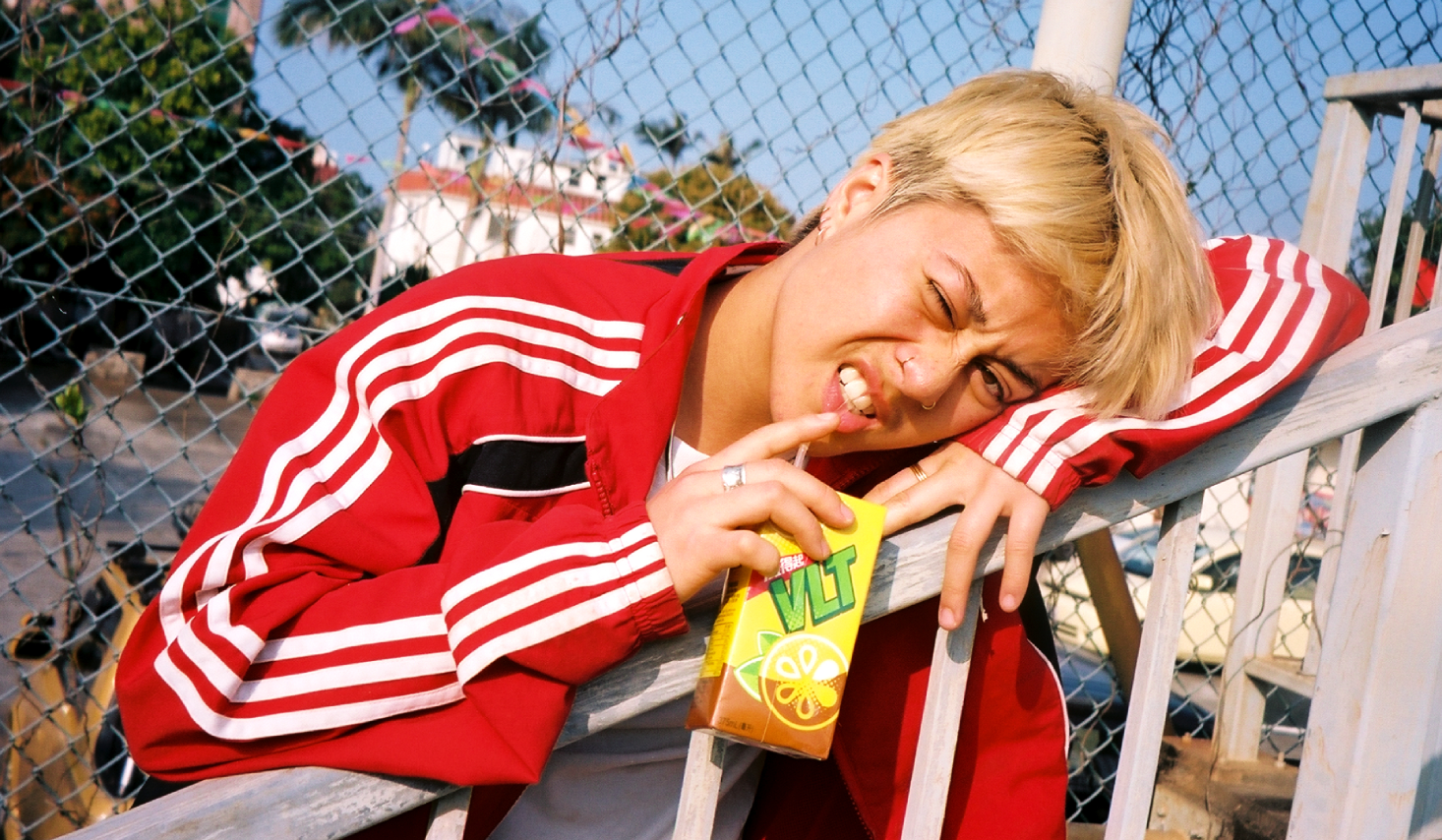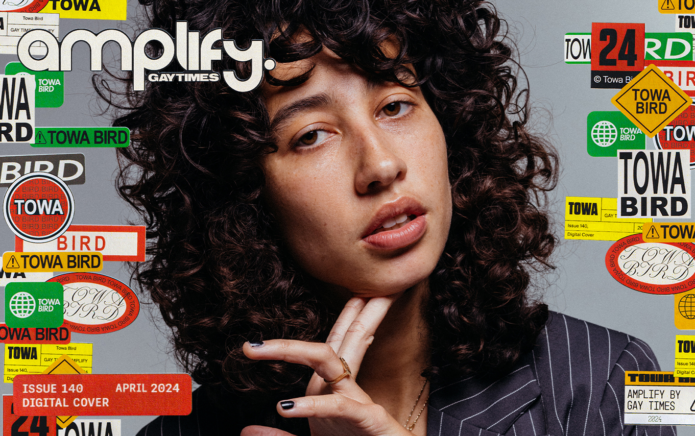
Ash Johnston, the brains behind BB Sway, is a rising star. His gentle, guitar-driven songs have already received over two million streams. How Will I Get There?, the third BB Sway EP, is defined by his signature, though changing, falsetto. Known for his knack for producing and songwriting, Johnston has emerged on the scene as a quietly powerful newcomer.
On his latest EP, the 24-year-old pulls together four dreamy tracks which pull on sweet melodies and old-school runs that will have you hooked. Now, months following the EPs release, the project has become a time capsule measuring their growth as a trans-masc person. In the latest instalment of our new music editorial series, Queer & Now, we chatted with Johnston about fusing identity with creativity and how his music changes with him.
Hey Ash! How did you get into music and what gravitated you to being an artist?
I grew up in a household where we always played music. I wouldn’t say that there are straight-up musicians or artists immediately in my family, but both sides are creative. We listened to a lot of music around the house, we’d go to shows here and there. I learned piano from an early age. I didn’t really enjoy it, I think piano lessons are very structured and theory-oriented. We moved to LA when I was about eight and I decided I wanted to learn to play guitar.
A couple of years into that I started making my own music and writing songs. A little later, I started to get back into piano and started producing, on GarageBand then Logic. I went to boarding school at around fifteen, which wasn’t too far from Brighton, where my aunt lived. I was there pretty much half the time, which was great because I could go to shows and meet other artists to get exposure to the music scene in the UK.
What kind of music did you listen to around the house growing up?
It was mainly my dad hogging the speakers. My mum would’ve been more into Mazzy Star and jazz. I remember she used to play a lot of Ella Fitzgerald to me as a kid, so I really enjoyed older jazz like that. My dad had a pretty eclectic mix. There was the ‘dad rock’ side of things, but he listened to a lot of pretty modern music. We listened to a lot of Green Day and Macy Gray a lot. One album, The Id, is very core to me as a childhood album. Avril Lavigne, as well, a lot of very early 2000s pop-rock. I listened to Cafe Del Mar, this collection of ambient world trance music, so you have artists like Bonobo on there. We listened to Massive Attack as well, Portishead, that sort of trip hop. Honestly, it was such a mix.
Your sound is often summarised as ‘dream pop’ or ‘indie lo-fi’. Would you agree with those descriptors?
Growing up in the streaming era, I don’t really uphold or value genre labels. I don’t like categorising my music. It’s always difficult to say what kind of music I make. I feel like I make a lot of different types of music, even outside of the ‘BB Sway’ project. There is a small part of me that has tried to keep a certain sound and explore different types of sound within the project.
You fuse identity with your creativity and self-expression a lot in your art. Why is that important to you?
My identity is a big part of the way I express myself creatively. We all create from our own personal space, so it’s always been very relevant to me. It’s become even more so as I’ve gotten further into my journey as a trans person and come to a lot of realisations about who I am. It’s very rare that I’ll write a song about just one thing or one situation, I’ll be inspired by a lot of different life experiences or feelings.
Often songs will be inspired by a romantic situation but also be relevant to my personal journey. ‘Everything You’ve Always Wanted’ is a good example of that, being initially inspired by a situation with someone else, but ended up just being as much about my personal journey. It’s interesting to navigate being an artist as a trans person because at the moment I’m going through a lot of changes which are really exciting.
Is ‘Everything You’ve Always Wanted’ one of your favourites from the EP?
It’s probably my favourite song on the EP. I love them all for different reasons, but I feel the most moved by that one. It’s the most personal and intimate. I like the idea that different trans artists find out more about themselves through the music – that’s been something I’ve been thinking about a lot recently. My voice is changing, getting lower, so I can’t sing in falsetto at the moment, and a lot of my songs are in falsetto. I’m not too stressed because I feel like it’ll come back when my voice settles. It’s like going through a second puberty. I have questions like, ‘Will I ever be able to perform the songs I’ve released in the same way?’
Would you want to reclaim them in a different way, having gone through transition?
That brings up a lot of interesting questions about change in general. If I were to play an old song now, of course, I would do a different arrangement and play it in such a way that I connect with it. Regardless of my transition, that would be the case. I’ve been working on new music lately that I’m singing in a lower register.
It feels euphoric to me doing that, but my voice is still changing, it hasn’t stopped. I was speaking to a friend about it the other day and they said, ‘Isn’t it so exciting that you’re making music that documents where you’re at in your transition, like the T process videos?’ That’s how I’ve been thinking about my music, making these songs and documenting my voice at this moment. Regardless of transition, this is the case; when you make a piece of art it’s like a stamp in time.
What’s the creative knock-on effect now that your register is changing?
We all go through changes and, as an artist, you have to think about how you’re going to accommodate them. I’ve definitely tried to maintain a positive view about it. I have a very positive, excited view for the future opportunities for exploring different sounds and utilising my voice in a different way. I’m taking a little break from performing and taking it easy because my voice is a bit unpredictable at the moment.
When I release a project I wonder if I’m ever gonna be able to sing those songs like that again. Maybe the perspective is, ‘Do I have to?’ Part of me thinks about the industry’s approach to the artists. The industry wants artists to be consistent in their imagery, brand and aesthetic. Sometimes I’d be asked not to do something super drastic with my hair during the period of an EP campaign for photoshoots or music video shoots. I’ve been asked to keep my look the same during that period, and it made me think about what is sometimes expected of us in terms of consistency.
The EP has been out a short while but can you share how it came about?
The EP came out fairly recently, in late May. It’s got four tracks and when I was putting it together, I wanted to collaborate with artists and producers on songwriting and production. Up until this EP, everything was self-produced and I didn’t have any co-writes, other than one track on the last EP mixed by someone else.
I’d been collaborating so much with people and I thought I’d like to have that reflected in my projects. Another thing is that I just wanted to write good songs. This time I wanted to write songs that could be stripped down to the most minimal version and still stand up. I also really wanted to play these live, which is ironic now considering my break. I was originally wanting to make an album, so I was writing a lot of material. I was working with a producer called Courage, who I met through working with Lava La Rue, and Hugo Hardy. I really enjoyed working with them on the production of these tracks.
We love the cover art – it’s very distinctive! Why did you choose that image?
That was actually taken by Lava La Rue when I was working with them on their new album. Lava took the picture, I was just eating, we were fully stocked up on food the entire time. I’m notorious for being a big snacker. I felt like a picture of me eating something was pretty representative of my state of being a lot of the time. There are probably deeper symbolic interpretations, slurping up the noodles trying to nourish yourself.
You work with a lot of creatives -like Lava- how does your process differ when you’re working with someone else
They feed into each other. These days, I’ll go into a session like ‘Let’s get creative, whatever we make, it may be for my project, yours or a collaborative thing.’ I love going into a session with that sense of freedom. It involves you trying to take away your ego a little bit, which can be so liberating. You’re making something outside of yourself. Collaboration is such an important source of creative stimulation for me.
Johnson’s new EP How Will I Get There? Is out now.
